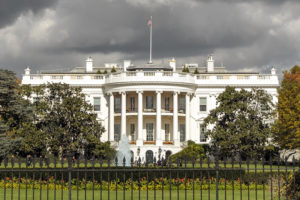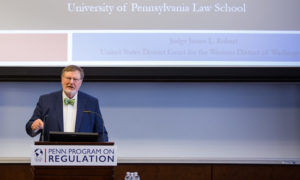
President Trump instructs DHS to detain families together, Supreme Court rules SEC’s administrative law judges must be appointed, and more…
IN THE NEWS
- President Donald Trump signed an executive order instructing the Secretary of Homeland Security to detain families together when possible. In doing so, the President blamed “Congress’s failure to act” and “court orders” for forcing the Administration to separate families to “effectively enforce the law.” Under the executive order, families are supposed to be detained together unless appropriations are unavailable or detention of the child with the parent “would pose a risk to the child’s welfare.” The Administration has not yet indicated when family separations will end and what will happen to currently separated families. Following the executive order, the U.S. Department of Justice sought to modify the Flores settlement, an agreement limiting the detention of migrant children.
- The U.S. Supreme Court ruled 7-2 that the Securities and Exchange Commission’s (SEC) administrative law judges (ALJs) are not “simply employees of the Federal Government” and must therefore be appointed by the agencies’ commissioners. SEC ALJs have “significant” legal authority, Justice Elena Kagan wrote for the majority, so they are “Officers of the United States” who must be appointed by the President, courts, or heads of federal agencies under the U.S. Constitution’s Appointments Clause. In dissent, Justice Sonia Sotomayor argued that SEC ALJs were not officers under the Appointments Clause because “they lack final decisionmaking authority”–they “can issue only ‘initial’ decisions.”
- President Trump proposed to merge the U.S. Department of Education and the U.S. Department of Labor into a single cabinet agency. The proposal follows a 2017 executive order directing the Office of Management and Budget (OMB) to “eliminate unnecessary agencies.” OMB Director Mick Mulvaney reportedly said that the proposal is part of the President’s “‘drain the swamp’ plan.”
- T-Mobile and Sprint asked the Federal Communications Commission for permission to merge into a new company. In their Public Interest Statement, the companies said the merger was “necessary” to the deployment of 5G networks, a goal “critical to enhancing consumer welfare.” The merged company, dubbed “New T-Mobile,” would put “competitive pressure” on Verizon and AT&T and will give consumers more data for less money, according to the companies. “This combination is going to be an incredibly good thing for consumers, jobs, and the country,” said T-Mobile chief executive officer John Legere.
- A federal district judge ruled that the structure of the Consumer Financial Protection Bureau (CFPB) was unconstitutional. Judge Loretta Preska of the U.S. District Court for the Southern District of New York found that the CFPB’s “composition violates the Constitution’s separation of powers,” as it is an independent agency headed by a single director who can only be dismissed for wrongdoing. Will Corbett, litigation counsel at the Center for Responsible Lending, criticized the decision as “a clear and completely inappropriate example of legislating from the bench.”
- President Trump signed an executive order encouraging economic activity on the oceans and Great Lakes, revoking an Obama-era executive order, which emphasized protecting these bodies of water. U.S. Representative Rob Bishop (R-Utah), chairman of the House Committee on Natural Resources, praised the order, claiming that it “will help the health of our oceans and ensure local communities impacted by ocean policy have a seat at the table.” The order faced criticism from conservationists. Christy Goldfuss of the Center for American Progress called the order an attempt by the President to “wash his hands of responsibility for the real and urgent threats facing America’s coastal communities—namely, the impacts of climate change.”
- The U.S. Food and Drug Administration (FDA) issued the first of three installments of draft guidance intended to protect against “potential attacks” on the United States’ food supply. The guidance focused on how manufacturers can develop and implement a food defense plan as required by the Food Safety Modernization Act. In their food defense plans, manufacturers must identify vulnerabilities and potential risk mitigation strategies in their food manufacturing processes.
- Colorado Governor John Hickenlooper (D) signed an executive order committing Colorado to adopt low emission vehicle standards. Hickenlooper noted that these standards “will protect our quality of life in Colorado” and that “every move we make to safeguard our environment is a move in the right direction.” This order follows U.S. Environmental Protection Agency (EPA) Administrator Scott Pruitt’s announcement that EPA would look to loosen emissions standards for cars and light trucks.
- FDA approved the first generic versions of Suboxone sublingual film, a medication to treat opioid dependence. FDA Commissioner Scott Gottlieb praised the move as “promoting the development of better drugs” and ensuring broader patient access to needed medications. The approval of generic medications is part of a larger FDA effort to promote competition among drug manufacturers, increase patient access to medications, and reduce prices.
- The U.S. Department of Housing and Urban Development (HUD) issued an advance notice of proposed rulemaking inviting comment on possible amendments to the Fair Housing Act (FHA). HUD solicited comments to determine what changes, if any, should be implemented after the 2015 U.S. Supreme Court ruling in Texas Dept. of Housing and Community Affairs v. Inclusive Communities Project, Inc., which determined the FHA protects against practices that produce a disparate impact on minorities. Comments will be accepted until August 20, 2018.
- The European Union’s Legal Affairs Committee voted in favor of a directive on “Copyright in the Digital Single Market,” which would tighten copyright requirements across the Internet. Among other provisions, websites would be obligated to obtain licenses from media companies before linking to their stories, a requirement which previously only extended to performing arts and television. In addition, websites that host large amounts of user uploads would be required to work with rightsholders to avoid copyright infringement. Sir Tim Berners-Lee, the inventor of the World Wide Web, joined in an open letter against the directive; the letter’s authors asserted that the directive would turn the Internet “into a tool for the automated surveillance and control of its users.”
WHAT WE’RE READING THIS WEEK
- Dan Ciuriak, Senior Fellow at the Centre for International Governance Innovation, wrote in a recent paper that regulatory uncertainty surrounding the rapidly evolving data-driven economy creates a paradox for entrepreneurs. Ciuriak argued that entrepreneurs face heightened incentives to wait for regulatory certainty before making new investments, but that delaying investment also increases risk that they will fail to “capture and defend” critical new market share. “Public policy makers and CEOs need to recognize this and create the risk-sharing framework that will unlock the investment needed to own the podium in the data-driven economy,” Ciuriak concluded.
- In a forthcoming article for the Yale Journal of International Law, Suren Gomtsian of the University of Leeds School of Law, Annemarie Balvert of Tilburg University, Branislav Hock of the University of Portsmouth, and Oguz Kirman of Tilburg University discussed how the “private legal order” of the Fédération Internationale de Football Association (FIFA) has functioned for the organization’s benefit. Gomtsian and his co-authors focused on FIFA’s ability to offer “harmonized institutions that apply across national borders” and that can serve the organization’s needs better than the regular courts of the member countries.
- Banks under CFPB oversight have not significantly reduced their mortgage lending volume, found Andreas Fuster, Matthew Plosser, and James Vickery in a Federal Reserve Bank of New York staff report. Using a series of economic models, the authors studied a variety of hypothesized effects on mortgage-issuing behaviors before and after the CFPB was created. Their findings suggest that, under CFPB oversight, banks have issued fewer small or risky mortgages but are not more likely to deny mortgage applications.



